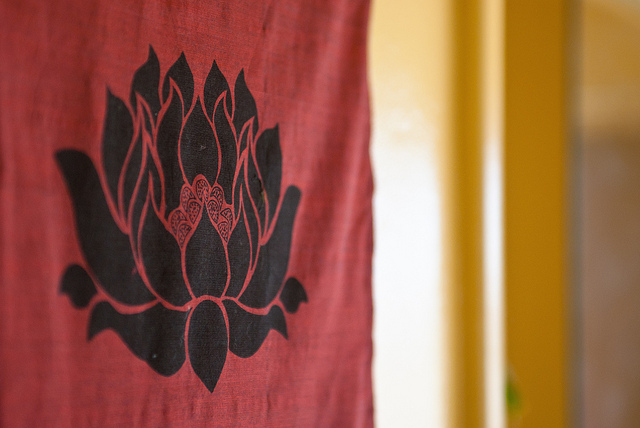A little over a month ago, I did something that felt simultaneously as if my entire life was shifting, and paradoxically that there was no big deal at all: I opened my own yoga studio.
After six months of absolute work, my boyfriend, Oli, and I have found our names attached to a business name that wasn’t registered in 2013, wearing the unprecedented uniform of new business owners.
Opening a business feels nothing like I thought it would feel (big surprise), but mostly what it feels like is that I have nestled myself inside of something that is always rapidly changing, because that’s what business does—it comes and goes.
Customers, employees, transactions, reports, meetings, to-do lists, favors, events: they come and they go.
It will always come and go.
I know I already used the word paradox in this article, so please bear with the repetition—I’m going to use that word again to describe the feeling of this coming and going of business. At first, it seems like the comings and goings might feel like turbulent movement—like trying to stay upright and planted through a tornado.
But the paradox is that it actually feels very grounding. There is something deep within ourselves that wants to find that which does not move—that which is completely still, completely impervious to the fluctuations of the outer world. When we are in this place, it feels like rather than trying to survive a tornado, we are standing within reach of a blow-dryer’s wind, and what could feel like air moving at fatal speeds now feels like a warm breeze just strong enough to dry our hair after showering.
Of course it doesn’t always feel this way. Sometimes there are moments of tornado threat—fear that I may get swept away and tumbled through obstacle courses of finance hassles or insecurity about the quality of my yoga teaching or the onset of juggling my attention for friends and employees and customers and other business owners. These are the fears that tell me that I must change something about myself in order to succeed—a belief that I am not good enough as I am, that I must have an addendum that will single-handedly catalyze my transition from the bottom shelf of mediocrity to the display case of high-end treasures.
And yet, I know none of what I just said is true, because the time is here and the moment is now, and in this here and now, I am sitting in our bed typing away on this article.
Oli is supposedly in the other room, but this is also an assumption—a deduction from my memory of him walking in here two minutes ago letting me know he was going to go sit in the living room. Right now, there is no yoga studio, there is no Oli, there is no apartment in downtown Chicago.
There is just Brenti sitting in bed.
And right now, I am filled with the essence of my efforts, which is to say, I am filled with all the good-feeling intention that has propelled us thus far into even having our own yoga space to call our home.
This is an intention that is not spiteful of anyone else’s efforts to have their own yoga studios, and not spiteful of anyone’s desire to practice at other yoga studios. The intention is simply to enjoy my life, and to create dynamic situations in my life that feel good to be a part of.
Up until about two months ago, the situations I was putting myself into felt rather chaotic. This was a life of an independent contracting yoga teacher—hopping between studios and communities and varying business vocabulary.
I’m sure there’s a way to enjoy and thrive in this lifestyle, but after a grueling 25 classes-a-week schedule, I found myself feeling tired and somewhat misguided, and I continually trudged back home feeling like I was working at a bunch of studios that were almost the right fit but not exactly. Of course it felt like that—I was a tourist at these studios, not a resident.
I’ve had the pleasure of working with great people—great studio owners and fellow teachers and students. But there was still a longing for a place to call home—a place that required absolutely no performance or pre-requisite for entry—a place where it feels free to be myself.
I think the saying goes, “If the mountains won’t come to Mohammed, then Mohammed must build the mountains.” (That’s correct, isn’t it?)
So we started building mountains. But it didn’t feel like mountains. It felt like little rolling hills of adventure—let’s learn about budgeting, let’s learn about managing yoga studios, let’s learn about real estate, let’s learn about website development. Let’s have fun so that even if we fall flat on our Humpty Dumpty faces, our King’s Men will still say our capitol investment was a worthwhile bet, even though all of our money will have disappeared.
The adage doesn’t tell Mohammed how to build the mountains, it just says build them.
Building them is different than climbing them, and so here I am, decidedly shifting from yoga studio teacher to yoga studio owner (although I will still teach yoga).
To me, this feels like a public shift, a shift that will be seen by many different people and perceived through many different lenses. It almost makes me wonder if human beings are meant to endure this kind of invisible watching from others because it feels challenging to remain unaffected by other peoples’ thoughts and opinions.
And here’s the thing: everybody has an opinion, and those opinions are mostly transparent.
From what I can gather, it seems like the most critical opinions are coming from within the yoga community itself, from studio owners and employees, as if there is some sort of territorial code of conduct that has made us all believe that new yoga studios are somehow threatening to existing yoga studios.
I’m deriving this only from my own experience, watching what seems like discomfort arise in the faces and bodies of other studio owners we speak with, as if our hypothetical success somehow lessens their own efforts in the community.
Ultimately, I can’t say with certainty what someone else’s experience is, but it seems like there are quite a few people that have resistance to there being a new yoga baby around. This might make sense to me if the perceived threat was that we opened our yoga studio across the street from someone else’s, but that’s not the case, and there is no immediate logical threat that I can think of, besides that competition runs in the undercurrent of our primal blood-line and so it is very natural for us to feel threatened by each other.
Maybe this resistance is standard in the business of yoga, since we don’t hear about yoga studio owners becoming billionaires from their endeavors.
But why not? Why can’t every single one of us get exactly what we want? Why does it feel like if someone else gets what they want, we won’t get what we want? Why are we looking at life as if there are limited supplies of things?
I ask these questions rhetorically but I think they’re worth answering, especially for those of us who are interested in the observation and refinement of our thoughts (aka: the yoga community). When we start observing ourselves when we feel threatened, we come to see that the feeling of threat comes about when we mentally create scenarios of what we don’t want to happen. Of course it freaks us out when we start believing that any of those scenarios might unfold. (Even though those scenarios will never unfold.)
We all go through this. But sometimes we get caught pointing our fingers away from ourselves, letting our minds believe that other people are the direct cause of our feelings, as if other people could somehow cause us to feel a certain way. There’s nothing wrong with us doing this—no one is going to come over to us and demand that we stop blaming other people for our feelings—but it’s also not very useful, because no matter how loud we tell people to stop doing something that pisses us off, people will never behave the way we want them to.
A more useful question might be: why am I feeling threatened in response to this?
This feeling of threat is really a disservice to ourselves when we start believing in our made-up stories of why we are right to believe in what we believe in, and when we want recognition from others that our emotional bullet-points are valid. It’s a disservice because then we are the ones who are not enjoying ourselves.
I am just a wee-little-one in the yoga jungle now. Ask me in five years how I look at things and I’m sure my story will be different (there’s no way that it won’t be). But for today, I’m thinking that the business of yoga is a reminder that there are always unknowns, and the practice of yoga is the ability to stay calm throughout them.
To return to the paradox from earlier: this is what it feels like to stand inside the tornado, effortlessly planted, feeling nothing but a blow-dryer breeze.
This is the coming and going of business. It’s the coming and going of people saying, “I like what you do,” and people saying, “I don’t like what you do.” It’s people walking in and asking for memberships, and people walking in and never coming back. It’s the ability to feel nice inside and behave nicely towards people who are maybe not feeling very good around you.
It’s yoga.
This is why we built those mountains.
Love elephant and want to go steady?
Sign up for our (curated) daily and weekly newsletters!
Editor: Renée Picard
Image: Robert Bejil at Flickr


 Share on bsky
Share on bsky





Read 0 comments and reply